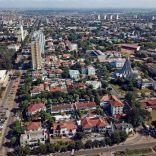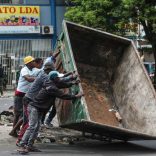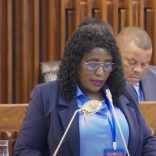Mozambique cuts rate to record low to aid recession economy
Mozambique needs “Plan B” to ease debt

DW (File photo)
A group of German NGOs has floated the idea of the UN helping find a mediator to negotiate a settlement between the Mozambican state and creditors
Jürgen Kaiser, coordinator of the German Erlassjahr coalition of non-governmental organisations advocating debt relief for poor countries has just been in Mozambique on account of the crisis brought on by the so-called “hidden debt” scandal, and presented the scheme in Maputo to the applause of Mozambican debt-monitoring NGOs.
At stake are the US$1.4 billion in loans guaranteed by the government to state subsidiary companies Ematum, ProIndicus and Mozambique Asset Management (MAM). These loans were not declared in the public accounts, leading the International Monetary Fund and other donors to suspend aid.
“Mozambique cannot easily get out of a situation like this the traditional way,” says Kaiser, as old debt relief initiatives no longer exist. “Also because the creditors of the so-called Paris Club, which could theoretically create opportunities for debt relief, are no longer the major creditors. These are now the bond holders or countries that are not part of the Paris Club, like China”.
Mozambique’s public debt has been estimated at EUR10 billion, or more than 70 percent of the gross domestic product. Of this, almost EUR9 billion is foreign debt, and both figures could increase before the end of the year, rating agencies say.
“Plan B” up the sleeve
Presently, there is “no mechanism to produce debt relief in a consistent and targeted way,” Kaiser says, and at an international forum held in Maputo on June 22 and 23, the German NGO presented the idea that “parliament and civil society, but also the government, especially the Ministry of Finance, could unite to develop some kind of Plan B for Mozambique”.

This plan would be based on the so-called roadmap of the United Nations Conference on Trade and Development guide published in 2015 to deal with sovereign debt.
“One hopes that it is not necessary, but should it be used, it could be a relatively straightforward process for Mozambique to openly and transparently negotiate debt relief with all its creditors, with the support of the UN,” Kaiser explains.
International mediator
While the debate in Maputo focuses mainly on the question of who was responsible for the hidden debts, the idea of UN intervention was welcomed by the Mozambican Debt Group (GMD).
“From the point of view of the agreements with the International Monetary Fund (IMF) and bilateral partners which were violated, it may also makes sense for there to be external mediation along with out own” says GMD’s Eufrigínia dos Reis.
The general coordinator of the debt-monitoring NGO considers the idea of having an international figure as a mediator “productive”, saying it could even bring “more benefits to the country from the point of view of restoring trust and self-discipline, considering that the error was internal”.

The head of the GMD, which is part of the civil society Budget Monitoring Forum (FMO), is aware that in the short term it will be difficult to find a solution to the crisis, but believes in the “good faith” of international partners.
She also calls for more transparency to “clean up the image” of the country. “We are a very wise people. If this [irregularity] was committed by a group, it would be very serious if all Mozambicans were made to pay for it,” she says.
Dos Reis draws attention to the statement signed by all the international forum participants. “Just the fact that we achieved a joint statement already shows the seriousness and commitment that Mozambicans are adopting in the face of the circumstances,” she concludes.
Africa’s rising debt
Mozambique was one of the major beneficiaries of historic debt relief in 2005, when it was still recovering from 16 years of civil war. At that time, under the Heavily Indebted Poor Countries support initiative, the international community wrote off Mozambican debt totalling US$3 billion.
Since then, however, Mozambique has returned to a trend of accumulating debt.
The crisis in Mozambique is mainly linked to two main factors: “One of them is the strong inflow of foreign capital due to low interest rates and the other is the need for large investments in the sectors of infrastructure and exploitation of natural resources,” says Jürgen Kaiser.
After the discovery of large gas reserves in the north, the country invested a lot in revenue coming from this sector, and this created problems for the economy, he adds. Indeed, countries that have invested heavily in the exploitation of resources and are highly dependent on foreign capital are in the same situation. According to Kaiser, this is the case of neighbouring Zambia, “grappling with a similar social, political and economic crisis,” not to mention the case of Ghana, where despite the discovery of oil on the coast the increase in debt is seen as “alarming”.
The debt of several African countries is getting closer to the levels of 2005, when the pardon reached US$100 billion.













Leave a Reply
Be the First to Comment!
You must be logged in to post a comment.
You must be logged in to post a comment.